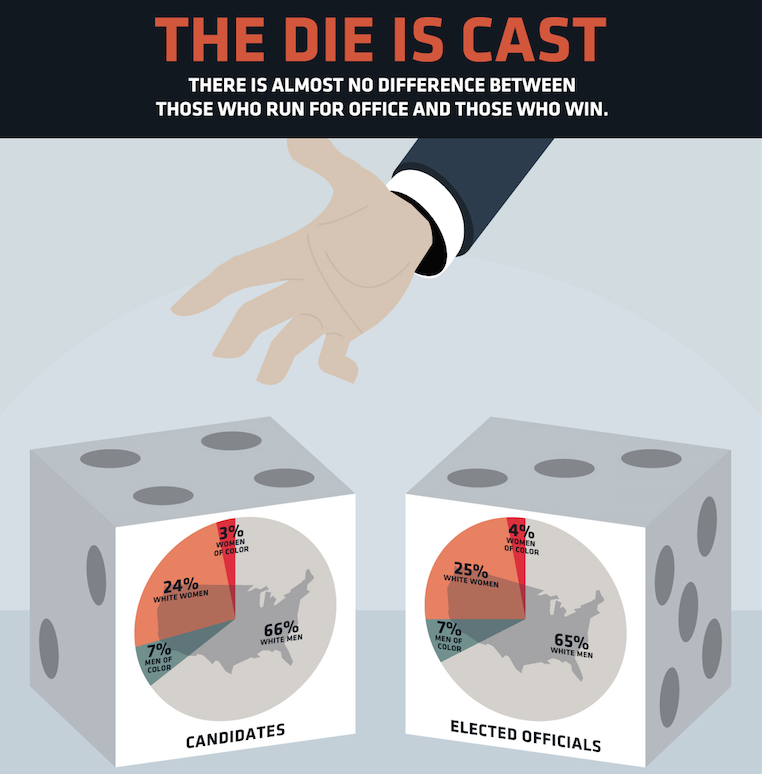Where are the South's women candidates?

A recent report from the Reflective Democracy Campaign finds that candidates running for public office are unreflective of the gender and racial makeup of the broader population, contributing to a severe lack of diversity among elected officials nationwide. (Graphic courtesy of the Reflective Democracy Campaign.)
On Tuesday, voters across the South went to the polls to vote for their candidates of choice among a pool of people representing various issues, platforms and ideologies. But when it came to racial and gender diversity, there was probably not a lot to choose from.
A new report titled "Who Runs (in) America" finds that the candidates running for elected office in the U.S. are disproportionately white and male compared to the broader population, contributing to a severe lack of diversity among elected leaders nationwide. In the South, the numbers reveal room for improvement in terms of racial diversity — and extreme underrepresentation for women.
Released by the Reflective Democracy Campaign (RDC), a project of the Women Donors Network, the report reviewed the race and gender of 51,000 candidates at the federal, state and county levels who ran in the 2012 and 2014 general elections. It found that while white men make up 31 percent of the overall population, they accounted for 66 percent of candidates. That suggests that the lack of gender and racial diversity among elected officials nationwide, which RDC reported on in its 2014 "Who Leads Us" campaign, can't be blamed only on voters choosing white, male candidates over women and people of color but on the dearth of diversity on the ballot to begin with.
In the South, the report's state-level breakdowns reveal extremely poor representation of women candidates. The region is home to the four states with the nation's lowest share of women candidates: Louisiana, where women make up 12.5 percent of candidates; Kentucky at 14.5 percent; and Tennessee and Alabama at 19 percent. West Virginia and South Carolina are also among the bottom 10 states for women candidates.
Representation among white women in Southern states was relatively low compared to other states in the country, while women of color were relatively better represented in the South. But within each Southern state, white women were still better represented among candidates than women of color.
In terms of race, the South has a more diverse candidate pool compared to the rest of the country, reflecting the large populations of color that live in non-Appalachian Southern states. Mississippi, Louisiana, Virginia, South Carolina, Alabama and Georgia are among the top 10 states with the most racially diverse candidate pools, with candidates of color making up over 20 percent of all candidates.
However, the report does not compare these figures to those states' overall nonwhite population. A look at 2013 Census Bureau numbers show that nonwhite populations in those six Southern states range from 33 percent to 45 percent, suggesting a gap in representation still exists.
"The stark imbalance between the demographics of the American people and their elected officials will not change until voters have the opportunity to choose among candidates who reflect their communities," said Women Donors Network CEO Donna Hall.
Diversifying the candidate pool will require dismantling barriers to running for public office, which include having to give up a full-time job, raising campaign funds and being connected to and vetted by existing political networks, the report says. Leveling the playing field by addressing these hurdles could put more diverse candidates into the running, ultimately making possible a more reflective governing body in the South and the country.
Tags
Allie Yee
Allie is a research fellow at the Institute for Southern Studies and is currently studying at the Yale School of Management. Her research focuses on demographic change, immigration, voting and civic engagement.
